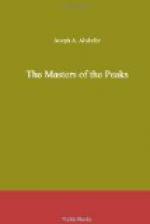The huge Ojibway was more huge than ever. Robert was convinced that he was the largest man he had ever seen, not only the tallest, but the broadest, and the heaviest, and his very lack of clothing—he wore only a belt, breech cloth, leggings and moccasins—seemed to increase his size. His vast shoulders, chest and arms were covered with paint, and the scars of old wounds, the whole giving to him the appearance of some primeval giant, sinister and monstrous. He carried a fine, new rifle of French make and two double barreled pistols; a tomahawk and knife swung from his belt.
Robert, nevertheless, met that full gaze firmly. He shut from his mind what he might have had to suffer from Tandakora had the Ojibway held him a captive in the forest, but here he was not Tandakora’s prisoner, and he was in the midst of the French army. Centering all his will and soul into the effort he stared straight into the evil eyes of the Indian, until those of his antagonist were turned away.
“The Owl has a prisoner whom I know,” said Tandakora to Langlade.
“Aye, a sprightly lad,” replied the partisan. “I took him before the winter came, and I’ve been holding him at our village on Lake Ontario.”
“It was he who, with the Onondaga, Tayoga, and the hunter, Willet, whom we call the Great Bear, carried the letters from Corlear at New York to Onontio at Quebec. The nations of the Hodenosaunee call him Dagaeoga, and he is a danger to us. I would buy him from you. I will send to you for him fifty of the finest buffalo robes taken from the great western plains.”
“Not for fifty buffalo robes, Tandakora, no matter how fine they are.”
“Ten packs of the finest beaver skins, fifty in each pack.”
“It’s no use to bid for him, Tandakora. I don’t sell captives. Moreover, he has passed out of my hands. I have had my reward for him. His fate rests now with the Chevalier de St. Luc and the Marquis de Montcalm.”
The Ojibway’s face showed foiled malice. “It is a snake that the Owl warms in his bosom,” he said, and strode away. The partisan followed him with observant eyes.
“It is evident that the Ojibway chief bears you no love, young Monsieur Lennox,” he said. “Now that you have served the purposes for which I held you I wish you no harm, and so I bid you beware of Tandakora.”
“Your advice is good and well meant, and for it I thank you,” said Robert; “but I’ve known Tandakora a long time. My friends and I have met him in several encounters and we’ve not had the worst of them.”
“I judged so by his manner. All the more reason then why you should beware of him. I repeat the warning.”
Robert was not bound, and he was permitted to roll himself in a blanket and sleep with his feet to the fire, an Indian on either side of him. Save where a space had been cleared for the French army, the primeval forest, heavy in the foliage of early spring, was all about them, and the wind that sang through the leaves united with the murmuring of a creek, beside which Langlade had pitched his camp.




